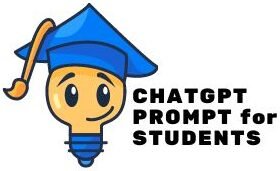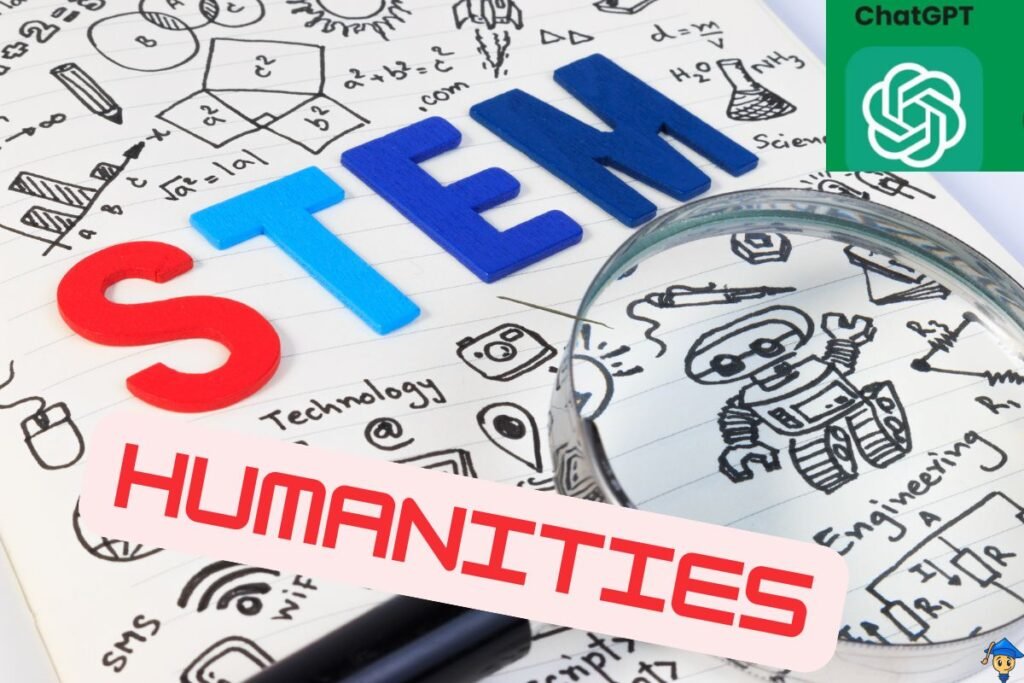Hey there, 12th-grade students and Class 12 enthusiasts! 🎓 Are you tired of the same old education trap that seems to squeeze the creativity out of learning? Well, you’re not alone. While effective in some aspects, the traditional education system often falls short in engaging students and nurturing their talents.
But fear not! There’s a game-changer– ChatGPT. This revolutionary tool is here to rescue you from the clutches of the education trap and pave the way for a more holistic and personalised learning experience.
With ChatGPT, you have the power to break free from the shackles of rote learning and embrace a dynamic approach to education. Gone are the days of mindlessly memorising facts and figures. Instead, you can engage with ChatGPT prompts designed specifically for 12th-grade students, tailored to help you learn effectively and efficiently.
In this article, I’m thrilled to provide you with ready-to-use ChatGPT prompts that will unleash your creativity, deepen your understanding of various subjects, and empower you to excel in your academic journey. No more wasting time and money on expensive tutors or endless tuition classes. With ChatGPT, the knowledge you seek is just a copypaste away.
So, what are you waiting for? Let’s dive into the world of ChatGPT and unlock your full potential. Say goodbye to the education trap and hello to a brighter, more fulfilling future.
Let’s get learning and saving – both time and lakhs of money! 💡✨
ChatGPT Prompts for 12th-grade Students: Copy, Paste & Learn
Are you a 12th-grade student looking to enhance your understanding of various subjects? Look no further! With ChatGPT prompts tailored for class 12 students, you can delve deeper into English, Hindi, Bengali, Physics, Chemistry, Biology, Mathematics, History, Geography, Economics, Political Science, Accountancy, Business Studies, Business Mathematics, Philosophy, Sociology, and Psychology.
Here are some effective prompts to help you:
Mathematics
1. Calculus:
“Can you explain the fundamental theorem of calculus and provide an example?”
“How do you find the derivative of a function using the chain rule? Please give a step-by-step explanation.”
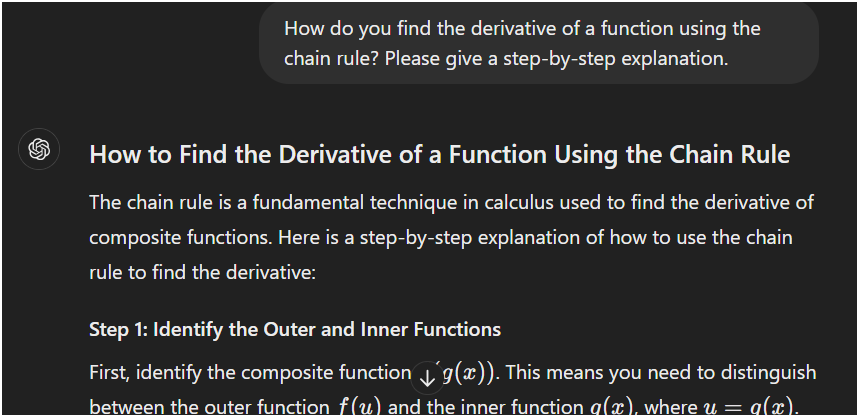
2. Algebra:
“What are the steps to solve a quadratic equation using the quadratic formula?”
“Can you explain how to factor polynomials? Provide an example.”
3. Geometry:
“How do you prove that two triangles are similar? Give an example with steps.”
“What is the Pythagorean theorem, and how is it used in real-world applications? Provide a practical example.”
4. Statistics:
“Can you explain how to calculate the mean, median, and mode of a data set? Provide an example.”
“What is the difference between a population and a sample in statistics? Why is this distinction important?”
Physics
1. Mechanics:
“How do you calculate the acceleration of an object given its initial velocity, final velocity, and time taken?”

“Can you explain Newton’s three laws of motion with examples?”
2. Electricity and Magnetism:
“What is Ohm’s Law and how is it used in circuit calculations? Provide an example.”
“How does electromagnetic induction work? Explain with the help of Faraday’s law.”
3. Thermodynamics:
“What are the laws of thermodynamics, and how do they apply to everyday processes?”
“Can you explain the concept of entropy and its significance in physical systems?”
4. Optics:
“How does the refraction of light work? Explain Snell’s Law with an example.”
“What is the difference between reflection and refraction? Provide examples of each.”
Chemistry
1. Organic Chemistry:
“Can you explain the difference between alkanes, alkenes, and alkynes? Provide examples of each.”
“How do you name organic compounds using IUPAC nomenclature? Give an example.”
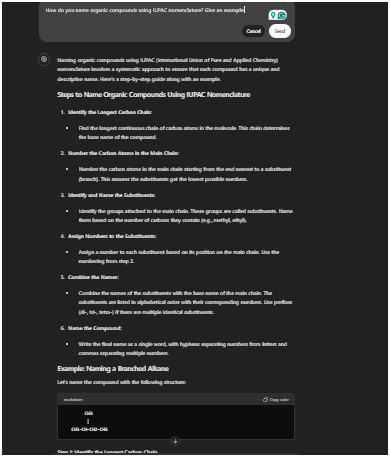
2. Inorganic Chemistry:
“What are the trends in the periodic table for atomic radius, ionization energy, and electronegativity?”
“How do you balance a redox reaction in an acidic solution? Show the steps.”
3. Physical Chemistry:
“What is the concept of Gibbs free energy, and how is it used to predict the spontaneity of a reaction?”
“Can you explain Le Chatelier’s principle and how it applies to chemical equilibria?”
4. Analytical Chemistry:
“How do you determine the concentration of a solution using titration? Provide a step-by-step explanation.”
“What are the different types of chromatography, and how are they used in chemical analysis?”
Biology
1. Genetics:
“Can you explain the process of DNA replication? Outline the main steps.”
“What is Mendel’s law of independent assortment and how does it apply to genetic inheritance?”
2. Ecology:
“What are the main components of an ecosystem and how do they interact?”
“Can you describe the carbon cycle and its importance to the environment?”
3. Human Physiology:
“Can you describe the process of cellular respiration and its importance in the human body?”
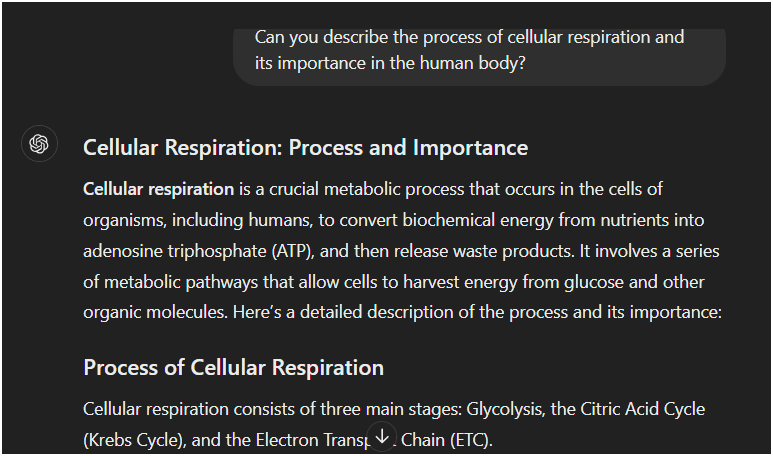
This image illustrates how glucose is broken down to produce ATP, highlighting the three main stages and their products.
“How does the human immune system function to protect against pathogens? Explain the roles of different types of cells involved.”
4. Evolutionary Biology:
“What is natural selection, and how does it drive the process of evolution? Provide examples.”
“Can you explain the evidence supporting the theory of evolution? Mention at least three different types of evidence.”
Computer Science
1. Programming:
“What are the basic concepts of object-oriented programming? Explain with examples.”
“Can you describe the difference between a stack and a queue in data structures? Provide examples of their uses.”
2. Cybersecurity:
“What are common types of cybersecurity threats, and how can individuals protect themselves?”

“Can you explain the concept of encryption and its importance in securing data?”
English Literature
1. Analysis:
“How do you analyze the theme of a novel? Use ‘To Kill a Mockingbird’ as an example.”
“What are the main literary devices used in poetry, and how do they enhance the meaning of the poem? Provide examples.”
2. Essay Writing:
“What are the key components of a persuasive essay? Can you outline the structure?”
“How do you develop a strong thesis statement for a literary analysis essay?”
3. Shakespeare:
“What are the main themes of Shakespeare’s ‘Macbeth,’ and how are they developed throughout the play?”
“How does Shakespeare use dramatic irony in ‘Romeo and Juliet’? Provide specific examples from the text.”
4. Modern Literature:
“How does George Orwell’s ‘1984’ explore the theme of totalitarianism? Provide examples from the book.”
“What are the key characteristics of modernist literature? Discuss concerning ‘The Great Gatsby’ by F. Scott Fitzgerald.”
History
1. World History:
“What were the causes and consequences of World War I?”
“Can you explain the significance of the Industrial Revolution and how it changed society?”
2. Modern History:
“What were the main factors leading to the Cold War, and how did it affect global politics?”
“How did the civil rights movement in the United States achieve its goals? Highlight key events and figures.”
3. Ancient Civilizations:
“What were the major contributions of Ancient Greece to Western civilization?”
“How did the Roman Empire influence the development of modern legal systems?”
4. Cultural History:
“How did the Renaissance change European society? Highlight key figures and their contributions.”
“What was the Harlem Renaissance, and how did it impact American culture?”
Social Studies
1. Psychology:
“What are the major theories of personality in psychology? Compare and contrast two of them.”
“Can you explain the concept of cognitive dissonance and provide an example?”
2. Sociology:
“How do sociologists study the impact of social media on society? What methods do they use?”
“What is the concept of social stratification, and how does it affect individuals and groups?”
Geography
1. Physical Geography:
“What are the major processes involved in the formation of a river delta? Provide examples.”
“How do tectonic plate movements cause earthquakes? Explain the different types of plate boundaries.”
2. Human Geography:
“What are the key factors influencing urbanization in developing countries?”
“How do cultural landscapes reflect the values and practices of a society? Provide examples.”
Economics
1. Microeconomics:
“What is the law of supply and demand, and how does it determine market equilibrium? Provide a graphical explanation.”
“Can you explain the concept of elasticity in economics? Give examples of price elasticity of demand and supply.”
2. Macroeconomics:
“What are the main components of Gross Domestic Product (GDP), and why is GDP important for measuring economic performance?”
“How do fiscal and monetary policies impact an economy? Explain with examples.”
Political Science
1. Comparative Politics:
“What are the different types of political systems, and how do they function? Compare democracy and authoritarianism.”
“How do electoral systems affect political outcomes? Discuss the differences between proportional representation and first-past-the-post systems.”
2. International Relations:
“What are the main theories of international relations, and how do they explain global politics? Compare realism and liberalism.”
“How do international organizations like the United Nations contribute to global peace and security?”
Environmental Science
1. Ecology:
“What are the different levels of ecological organization, from individual organisms to the biosphere? Provide examples for each level.”
“How do biotic and abiotic factors interact in an ecosystem? Explain with a specific ecosystem as an example.”
2. Sustainability:
“What are the principles of sustainable development, and why are they important for future generations?”
“How do renewable energy sources contribute to sustainability? Discuss the advantages and challenges of solar and wind energy.”
Accountancy
1. Financial Accounting:
“What are the key components of a balance sheet, and how do they reflect a company’s financial position?”
“Can you explain the double entry accounting system and provide an example of a transaction?”
2. Managerial Accounting:
“How do you prepare a budget, and why is budgeting important for businesses?”
“What are the differences between fixed and variable costs? Provide examples of each.”
Business Studies
1. Marketing:
“What are the 4 Ps of marketing, and how do they influence a company’s marketing strategy?”
“How can market research be used to identify customer needs and preferences? Explain the different methods of market research.”
2. Business Management:
“What are the key functions of management, and how do they contribute to the success of an organization?”
“Can you explain the concept of corporate social responsibility (CSR) and its importance for businesses?”
Business Mathematics
1. Financial Mathematics:
“How do you calculate compound interest, and what is its significance in financial planning? Provide a formula and an example.”
“What is the time value of money, and how is it used in business decision-making? Explain with an example.”
2. Statistics for Business:
“How do you interpret a correlation coefficient, and what does it indicate about the relationship between two variables?”
“What are the different types of probability distributions used in business statistics? Provide examples of each.”
Philosophy
1. Ethics:
“What are the main ethical theories, such as utilitarianism, deontology, and virtue ethics? Compare and contrast them.”
“Can you explain the concept of moral relativism and its implications for ethical decision-making?”
2. Epistemology:
“What is the difference between knowledge and belief, according to epistemologists?”
“Can you explain the concept of empiricism and how it contrasts with rationalism?”
Sociology
1. Social Structures:
“What is the concept of social stratification, and how does it affect individuals and groups in society?”
“How do sociologists study the impact of social institutions, such as family, education, and religion, on individuals?”
2. Cultural Sociology:
“What are the key components of culture, and how do they influence human behaviour and social interactions?”
“Can you explain the concept of cultural relativism and its importance in sociological studies?”
Psychology
1. Developmental Psychology:
“What are the main stages of cognitive development according to Piaget, and what are the key characteristics of each stage?”
“How does Erikson’s theory of psychosocial development explain the challenges faced at different stages of life?”
2. Clinical Psychology:
“What are the main types of psychological disorders, and how are they diagnosed and treated?”
“Can you explain the concept of cognitive-behavioural therapy (CBT) and its effectiveness in treating mental health issues?”
My dear children, try yourself to craft new prompts that fulfil your learning needs!
Here are some ChatGPt prompts to enhance your skills.
Let’s explore!
General Study Skills
1. Time Management:
“What are effective time management strategies for high school students preparing for exams?”
“How can I create a study schedule that balances school work, extracurricular activities, and rest?”
“How can you use tools like calendars and planners to organize your study schedule? Provide tips for maximizing their effectiveness.”
2. NoteTaking:
“What are some effective notetaking methods for high school students? Explain how to use the Cornell Method.”
“How can I summarize textbook chapters effectively for better understanding and retention?”
“What are the benefits of using the Cornell NoteTaking System, and how do you implement it?”
“How can you summarize information from lectures and textbooks to create useful study notes? Provide a step-by-step guide.”
3. Critical Thinking:
“What are some strategies to improve critical thinking skills? Provide examples of how to apply them in academic work.”
“How can you evaluate the credibility of a source when conducting research? List key criteria to consider.”
4. Problem Solving:
“What are effective problem-solving techniques for tackling complex math problems? Explain with an example.”
“How can brainstorming and mind mapping help in generating ideas for a research project? Describe the process.”
5. Active Learning:
“What are some active learning techniques that can help improve retention and understanding of complex subjects? Describe how to implement them.”
“How can group study sessions enhance learning? What are some strategies for making group study more effective?”
6. Memory Techniques:
“What are mnemonic devices, and how can they aid in memorizing information? Provide examples.”
“How does spaced repetition work, and why is it effective for long-term retention of information?”
7. Test Preparation:
“What are some effective strategies for preparing for standardized tests like the SAT or ACT?”
“How can you use practice tests to improve your performance on exams? Describe a step-by-step approach.”
8. Research Skills:
“What are the key steps in conducting academic research, from formulating a research question to writing a report?”
“How can you effectively use online databases and libraries to find credible sources for a research project?”
9. Stress Management:
“What are some techniques for managing stress during exam periods? Discuss both shortterm and longterm strategies.”
“How do regular exercise and healthy eating contribute to better academic performance and overall well-being?”
10. Active Reading:
“What strategies can you use to enhance comprehension and retention while reading academic texts?”
“How can annotating and highlighting key points in a textbook help improve your understanding of the material?”
11. Goal Setting:
“What are SMART goals, and how can they be used to improve academic performance?”
“How can you break down long-term academic goals into manageable short-term tasks?”
12. Critical Analysis:
“What steps should you take to critically analyze a research paper or academic article?”
“How can you distinguish between correlation and causation when evaluating research findings?”
13. Effective Communication:
“What are the key components of effective academic writing, and how can you develop a clear and coherent argument?”
“How can you improve your presentation skills for delivering academic content to an audience?”
14. SelfAssessment:
“What are some techniques for selfassessment that can help identify areas for improvement in your studies?”
“How can feedback from teachers and peers be used to enhance your academic performance?”
Remember, before attempting these prompts, it’s crucial to thoroughly understand each topic or chapter. Use these prompts to reinforce your learning, tackle homework and exercises, and prepare for competitive examinations.
Are you a curious student? Then head here.
Concerns of Parents About Mobile Misuse
We understand that parents may worry about their children’s misuse of mobile devices. Here are some solutions and advice:
1. Alternative Devices: Encourage your child to use a tablet, laptop, or desktop for studying instead of a mobile phone. These devices offer a more conducive environment for focused learning.
2. Safety Measures: Set up parental controls on devices to limit access to inappropriate content and monitor screen time. Additionally, educate your child about online safety and responsible usage.
3. Parental Involvement: Engage with your child’s learning journey by discussing their academic progress, supervising study sessions, and providing guidance when needed. Your involvement can help steer them towards productive use of technology.
On a positive note, technology can be a valuable tool for education when used wisely. Embrace the opportunities it offers to enhance learning and stay connected with educational resources.
Conclusion
In conclusion, ChatGPT prompts offer a versatile and effective way for 12th-grade students to deepen their understanding of various subjects. Experiment with these prompts, engage in meaningful learning experiences and unleash your full potential.
Ready to elevate your learning with ChatGPT prompts? Start exploring today and discover the endless possibilities for academic growth and enrichment.
Happy studying! 📚
